- Clone
- DJR1 (See other available formats)
- Regulatory Status
- RUO
- Workshop
- HCDM listed
- Other Names
- TRAIL-R1, Apo-2, CD261, TNFRSF10A
- Isotype
- Mouse IgG1, κ
- Ave. Rating
- Submit a Review
- Product Citations
- publications
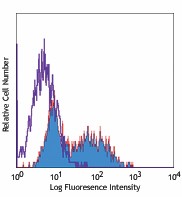
-

Human DR4 transfected cells stained with DJR1 PE
| Cat # | Size | Price | Quantity Check Availability | Save | ||
|---|---|---|---|---|---|---|
| 307205 | 25 tests | 113€ | ||||
| 307206 | 100 tests | 244€ | ||||
DR4 is 56 kD member 10A of the TNFR superfamily (TNFRSF10A), also known as TRAIL-R1, Apo-2, and CD261. It is expressed at low levels by activated T cells and some tumors. After TRAIL engagement, DR4 (TRAIL-R1), through activation of NF-κB, induces apoptosis in the TRAIL ligated cell.
Product DetailsProduct Details
- Verified Reactivity
- Human
- Reported Reactivity
- African Green, Cynomolgus
- Antibody Type
- Monoclonal
- Host Species
- Mouse
- Immunogen
- Extracellular domain of DR4-human IgG1 Fc fusion protein
- Formulation
- Phosphate-buffered solution, pH 7.2, containing 0.09% sodium azide and BSA (origin USA)
- Preparation
- The antibody was purified by affinity chromatography, and conjugated with PE under optimal conditions.
- Concentration
- Lot-specific (to obtain lot-specific concentration and expiration, please enter the lot number in our Certificate of Analysis online tool.)
- Storage & Handling
- The antibody solution should be stored undiluted between 2°C and 8°C, and protected from prolonged exposure to light. Do not freeze.
- Application
-
FC - Quality tested
- Recommended Usage
-
Each lot of this antibody is quality control tested by immunofluorescent staining with flow cytometric analysis. For flow cytometric staining, the suggested use of this reagent is 5 µl per million cells in 100 µl staining volume or 5 µl per 100 µl of whole blood.
- Excitation Laser
-
Blue Laser (488 nm)
Green Laser (532 nm)/Yellow-Green Laser (561 nm)
- Application Notes
-
Additional reported applications (for the relevant formats) include: The DJR1 antibody is useful for immunofluorescent staining and flow cytometric analysis of DR4/TRAIL-R1 receptor expression. For most successful immunofluorescent staining results, it may be important to maximize signal over background by using a relatively bright fluorochrome-antibody conjugate (Cat. No. 307206) or by using a high sensitivity, three-layer staining technique (e.g., including a biotinylated antibody or biotinylated anti-mouse IgG second step (Cat. No. 405303), followed by SAv-PE (Cat. No. 405204)).
- Application References
-
- Uno K, et al. 2003. Blood 101:3658.
- Sato K, et al. 2005. J. Immunol. 174:4025.
- Lundqvist A, et al. 2006. Cancer Res. 66:7317. PubMed
- Chen KF, et al. 2011. J Pharmacol Exp Ther. 337:155. PubMed
- Sonnemann J, et al. 2012. Cancer Biol Ther. 13:417. PubMed
- Chandrasekaran S, et al. 2014. PLoS One. 9:111487. PubMed
- Product Citations
-
- RRID
-
AB_2287472 (BioLegend Cat. No. 307205)
AB_2287472 (BioLegend Cat. No. 307206)
Antigen Details
- Structure
- TNFR superfamily, 56 kD
- Distribution
-
Activated T cells, tumor cells
- Function
- Induces apoptosis
- Ligand/Receptor
- TRAIL
- Cell Type
- T cells
- Biology Area
- Apoptosis/Tumor Suppressors/Cell Death, Cell Biology, Immunology
- Molecular Family
- CD Molecules, Cytokine/Chemokine Receptors
- Antigen References
-
1. Macfarlane M. 2003. Toxicol. Lett. 139:89.
2. Baetu T, et al. 2002. Cytokine Growth Factor Rev. 13:199.
3. Degli-Esposti M. 1999. J. Leukoc. Biol. 65:535. - Gene ID
- 8797 View all products for this Gene ID
- UniProt
- View information about CD261 on UniProt.org
Related FAQs
- What type of PE do you use in your conjugates?
- We use R-PE in our conjugates.
Other Formats
View All CD261 Reagents Request Custom Conjugation| Description | Clone | Applications |
|---|---|---|
| PE anti-human CD261 (DR4, TRAIL-R1) | DJR1 | FC |
| Purified anti-human CD261 (DR4, TRAIL-R1) | DJR1 | FC |
| APC anti-human CD261 (DR4, TRAIL-R1) | DJR1 | FC |
| PE/Cyanine7 anti-human CD261 (DR4, TRAIL-R1) | DJR1 | FC |
| TotalSeq™-B1183 anti-human CD261 (DR4, TRAIL-R1) | DJR1 | PG |
| TotalSeq™-D1183 anti-human CD261 (DR4, TRAIL-R1) | DJR1 | PG |
| TotalSeq™-A1183 anti-human CD261 (DR4, TRAIL-R1) | DJR1 | PG |
| TotalSeq™-C1183 anti-human CD261 (DR4, TRAIL-R1) | DJR1 | PG |
Customers Also Purchased
Compare Data Across All Formats
This data display is provided for general comparisons between formats.
Your actual data may vary due to variations in samples, target cells, instruments and their settings, staining conditions, and other factors.
If you need assistance with selecting the best format contact our expert technical support team.
-
PE anti-human CD261 (DR4, TRAIL-R1)
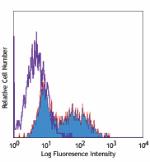
Human DR4 transfected cells stained with DJR1 PE -
Purified anti-human CD261 (DR4, TRAIL-R1)
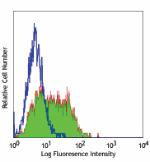
Human DR4 transfected cells stained with purified DJR1, foll... -
APC anti-human CD261 (DR4, TRAIL-R1)
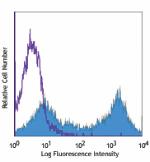
Human DR4 transfected cells stained with DJR1 APC -
PE/Cyanine7 anti-human CD261 (DR4, TRAIL-R1)
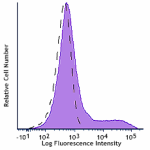
Human DR4 Transfected BHK cell line was stained with CD261 (... -
TotalSeq™-B1183 anti-human CD261 (DR4, TRAIL-R1)
-
TotalSeq™-D1183 anti-human CD261 (DR4, TRAIL-R1)
-
TotalSeq™-A1183 anti-human CD261 (DR4, TRAIL-R1)
-
TotalSeq™-C1183 anti-human CD261 (DR4, TRAIL-R1)
 Login / Register
Login / Register 










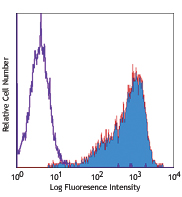
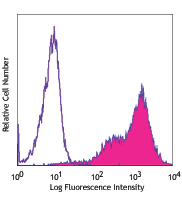

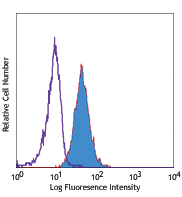



Follow Us